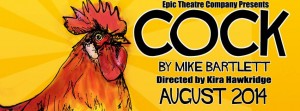 Plays with titles intentionally chosen to be unprintable in the mainstream press are usually terrible. The New York Times reviewed the off-Broadway American premiere under the title “___ (The Cockfight Play)” apparently thinking that a long low line would preserve the innocence of their readers, and separately profiled author Mike Bartlett as “The Playwright Who Chose That Title.”
Plays with titles intentionally chosen to be unprintable in the mainstream press are usually terrible. The New York Times reviewed the off-Broadway American premiere under the title “___ (The Cockfight Play)” apparently thinking that a long low line would preserve the innocence of their readers, and separately profiled author Mike Bartlett as “The Playwright Who Chose That Title.”
It would be no spoiler to say that this play has nothing to do with a rooster and little to do with a cockfight.
We are introduced to John (Johnny Sederquist) who shortly breaks up with his unnamed boyfriend (usually referred to as “M,” Michael Puppi). John quickly, although absent conscious intention, finds an unnamed girlfriend (usually referred to as “W.” Lindsy Bissonette). John, a naïve nebbish, seeks advice from his old boyfriend about how to court his new girlfriend, a solicitation not at all welcome. John is unable to let go of either of his relationships, essentially telling each of them that he will end things with the other. The old boyfriend suggests a dinner party where all three of them can meet, secretly also inviting his own father (Alan Hawkridge) who plays “straight man” with all of the subtlety or lack thereof implied by that term.
Director Kira Hawkridge, visiting Epic away from her own Out Loud company, makes masterful use of the black-box physical space, bouncing the characters around the room like pool balls without sets or props. The actors are uniformly excellent, and Sederquist especially carries a difficult role defined by extreme insecurity except for one definitive blast of forceful independence that, when it finally comes, is too late. The dialogue is clever and witty.
John is more prick than cock, so cowardly as to be thoroughly dislikable. He is the sort of person who walks up to your table in a coffee shop and asks if you mind if he joins you, and you then spend the next hour regretting letting him do it. He is less the fulcrum of a romantic triangle than an indecisive whiner forced to choose between daddy and mommy. There are clear hints that M with a successful career as a broker in the City and a nice apartment is more “sugar daddy” than boyfriend, whether he admits that to himself or not. W, by contrast, is the kind of woman who has already chosen the names of her future children before the first date.
Well, maybe there is a rooster. When the cock crows, according to folklore, is when the cold light of day drives away ghosts, apparitions, and illusions – when “no spirit dare stir abroad,” as Shakespeare writes in Hamlet, a work and its indecisive protagonist alluded to in more ways than one. The eventual dinner party takes on the character of an Agatha Christie drawing room where we find out whodunit and the truth is revealed.
There is a certain courageousness in taking on the very real abyss of being in love with two people at the same time and being forced to choose between them, treating it more seriously than the conventional notions of bubblegum pop songs where there are moral bright lines. No one here is cheating, at least not in the accepted sense of that term. Unfortunately, the evident unhealthy core of each relationship, where M seems attracted to John because he is weak and pliable and where W seems attracted to John because, she says, he is like a pencil drawing waiting to be filled in, prevents any serious exploration of polyamory or pansexuality or any similar concepts for which no one has gotten around to coining a trendy new word.
Why would any emotionally mature and healthy person be attracted to John? They wouldn’t be, and this proves ruinous in the end.
Cock, the Rooster Play, at Epic Theatre at the Artists’ Exchange, 50 Rolfe Square, Cranston. E-mail: EpicTheatreCompanyRI@gmail.com
Through August 16. Suitable for mature audiences, contains sexual themes and references, simulated sex, but no nudity.
Facebook: facebook.com/events/1499556050261072/
More Posts by The Author:
Existing is a Lot: A “F— Cancer” fundraiser
Severe Thunderstorm, Flash Flood Warnings: Reports of 1-inch diameter hail
Heavy Rain, High Winds, Flooding Wed–Thu: Advisory for wind, watches for inland and coastal flooding posted
River Flood Warnings in RI, MA, CT: Wed through Fri, streets may be impassable at times
Snow possible but unlikely Sat mid-day: Little accumulation likely


